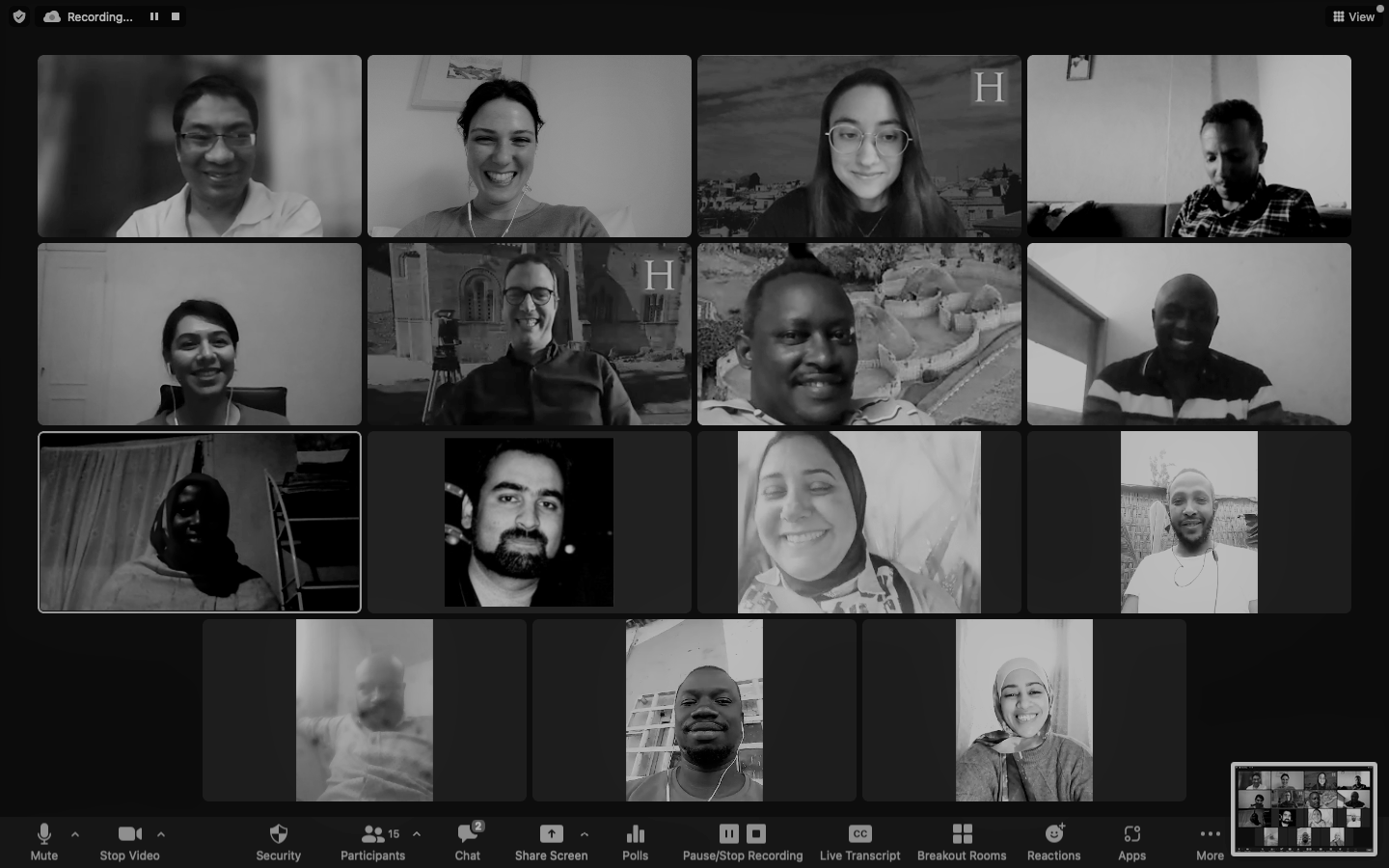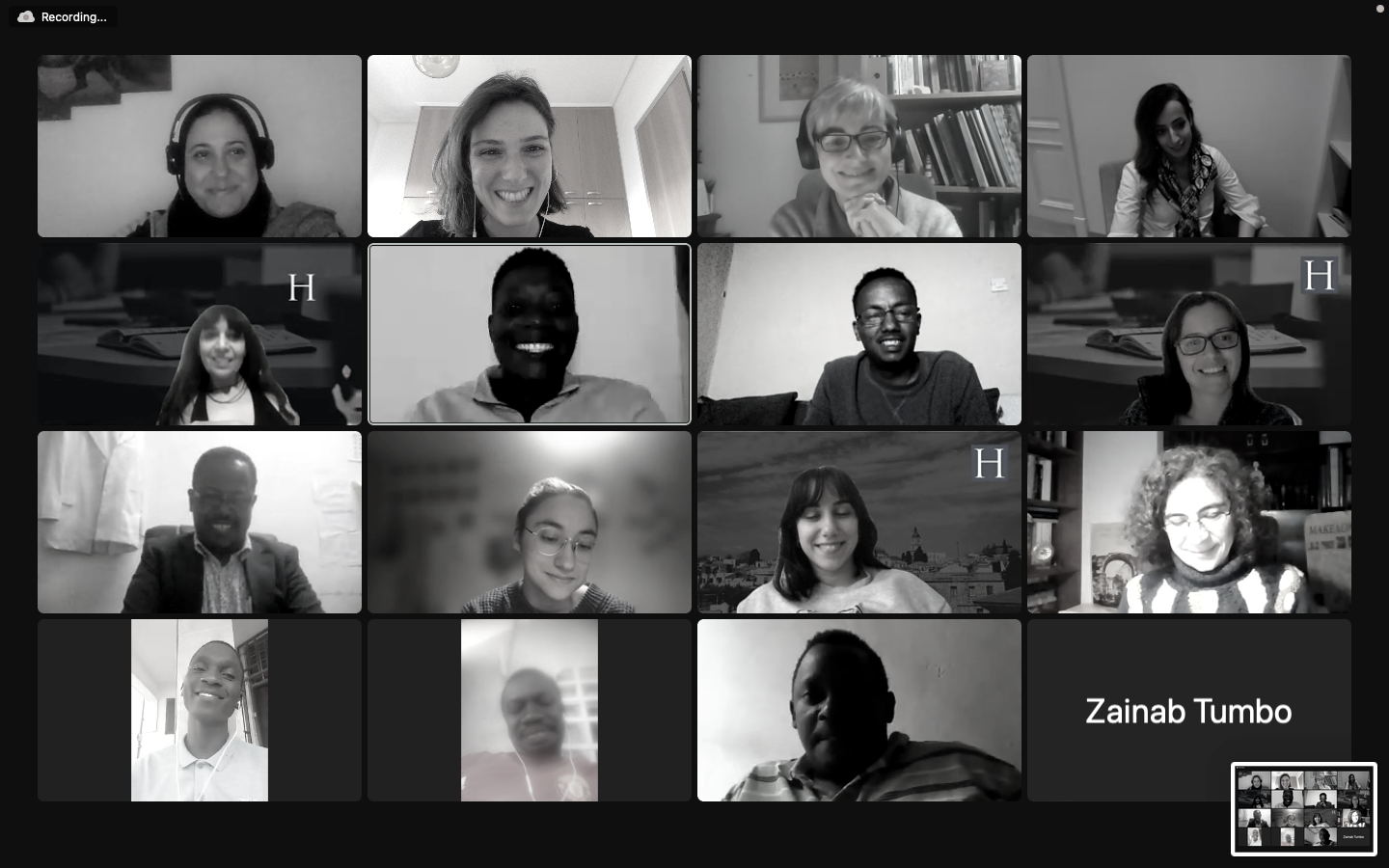: Uncategorized
“Introduction to the General Principles of Cultural Heritage Conservation” workshop
The online 3-day workshop on “Introduction to the General Principles of Cultural Heritage Conservation” took place from 18 to 20 March 2022.
28 heritage managers from Africa (Ethiopia, The Gambia, Ghana, Rwanda, Egypt, Tunisia, Kenya) and from Asia ( Pakistan, Jordan, Nepal, Iran) have been trained on the principles and objectives of conservation and its methodology.
During the workshop participants developed four projects practicing the principles of cultural heritage conservation. Participants identified the conservation infrastructure of their projects and recognized the importance of interdisciplinarity for a holistic conservation approach. They focused on issues of values, authenticity, integrity, and compatibility and how these concepts transform conservation into a process of change and continuity. They have been also introduced to the evolution of conservation, and the contemporary international context of conservation and they formed a better understanding of the potential of the action of conservation.
By attending the workshop, participants acquired a solid foundation of the notion, the purpose, and the aim of conservation. After completing the workshop participants are able to identify the conservation needs of their projects and collaborate with conservation specialists in order to apply all the necessary measures to safeguard and promote the cultural heritage assets of their region.
The workshop’s instructor: Alexis Stefanis is an Assistant Professor at the Department of Conservation of Antiquities and Works of Art of the University of West Attica. He has been involved in many research projects and has produced a significant number of studies and publications concerning the conservation, restoration, and rehabilitation of architectural heritage.
TEACH FOR FUTURE: Mentoring Campus in Romania
TEACH FOR FUTURE: Testing and certification of ICT skills and transfer of best practices between adult learners from Romania-Greece-Bulgaria, within the Mentoring Campus in Bucharest
ANBPR announced the organization, between 28th of March 2022- 1st of April 2022, of the Mentoring Campus in Romania (C4 – Blended mobility for adults regarding the testing and certification of IT skills and the transfer of best practices within the Center of Excellence in Romania). The Mentoring Campus in Bucharest will be attended by 30 adult beneficiaries from Romania, Greece and Bulgaria. This activity is part of the Erasmus+ TEACH FOR FUTURE project – Educational Transformation of Adults through Innovation, Technology and Entrepreneurship.
Following the local adult learning activities on ICT (Digital Marketing, Online Collaboration, 3D Printing and Image Editing), Management of Innovation & Network Collaboration and Entrepreneurship & Leadership, the top 30 adult participants from Romania, Greece and Bulgaria was invited to take part in the Mentoring Campus in Bucharest.
The activities of the Mentoring Campus will take place at the Center of Excellence in ICT in the National Library of Romania (presentations, guided tour, projections, exhibitions, demonstrations of innovative ICT solutions, best practices in 3D Printing, robotics, digitization, etc. ), as well as at the EduHub ECDL in Veranda Mall (taking ECDL simulations and certification exams).
After taking the certification exams, all 30 adult beneficiaries will have the opportunity to participate in a 3D Modeling and Printing competition, on two thematic components: 3D Entrepreneur and 3D for Life, respectively, the most innovative ideas will be awarded.
Participants from Romania, Greece and Bulgaria, who have created models produced in different media or formats, will choose to register in the competition as follows:
– 3D Entrepreneur: entrepreneurial ideas developed by adults
– 3D for Life: making functional objects by 3D modeling and printing.
“The TEACH FOR FUTURE project is a complex educational initiative, grafted on the current training needs of adults in the 3 participating countries. Both the transnational component of the learning process and the collaborative approach of this formative endeavor make TEACH FOR FUTURE a European-level educational reference. Regarding the transfer of specialized knowledge for adults in topical thematic fields, adapted to the current requirements of the labor market, our project aims to become a replicable model of best practices in other complementary areas of expertise”, said Ioana Crihană, TEACH FOR FUTURE Project Manager.
About TEACH FOR FUTURE: TEACH FOR FUTURE project is funded under the European Union’s Erasmus+ program, Key Action 2, Strategic Partnerships. The consortium of partners consists of the National Association of Public Librarians and Libraries in Romania – ANBPR, Romania, Global Libraries Bulgaria Foundation, Bulgaria, and Initiative for Heritage Conservation, Greece, as well as associate partners from all three countries involved: The National Library of Romania, Bucharest Metropolitan Library, “Octavian Goga” Cluj County Library, “Panait Istrati” Brăila County Library, “Kájoni János” Harghita County Library (Romania), Bulgarian Library and Information Association (Bulgaria) and Learning for Life (Greece).
About ANBPR: The most representative professional association of public librarians and libraries in Romania, concerned with the well-being and professional performance of its members, the evolution of the national cultural field and the substantial emancipation of communities. Starting from the basic principles of associative work – solidarity, cohesion, social employment and competitiveness – ANBPR advocates for the support of qualitative education, democratization of access to innovation and awareness on the benefits of technology for heterogeneous categories of library service users.
Contact information: [email protected]; phone: (+40) 758 220 291; www.anbpr.org.ro; www.teachforfuture.ro
The project is co-funded by the European Union.
HERITΛGE at the European Humanitarian Forum
HERITΛGE participated in the first European Humanitarian Forum that was hosted by the European Commission’s Civil Protection & Humanitarian Aid Directorate and France22 in Brussels, Belgium on 21-23 March. The Organization hosted a Humanitarian Talk on “The role of the private sector in fostering local identity and culture: emergency preparedness, relief and reconstruction” in cooperation with Greek Foreign Ministry.
The event’s goal was to highlight the private sector’s potential contribution to the preservation and strengthening of local identity and cultural heritage, from emergency preparedness through to relief and reconstruction efforts in crisis zones, achieving inclusiveness, resilience and sustainability. Cultural heritage (tangible and intangible) are directly tied to local and/or national identity and subsequently to social cohesion and resilience and can become important tools during humanitarian crisis.
“It is unfortunate, but timely, that the Forum is being held while we are facing the war in Ukraine,” Greek Foreign Minister Nikos Dendias pointed out while addressing the Talk. “Our goal is to highlight the role that the protection of cultural heritage can play in the prevention and mitigation of humanitarian crises,” he added.
Watch the Talk here.
“Climate Change, Heritage and Risk” workshop with the World Monuments Fund
The 6-day online workshop on “Climate Change, Heritage and Risk” took place between 18 January and 2 February, and was exclusively conducted for the World Monuments Fund professionals.
The workshop was sponsored by the World Monuments Fund and the Heritage Management Organization. 17 WMF heritage managers from Italy, Spain, the UK, Portugal, India, and the USA attended the course. They have been introduced to new insights regarding climate change, and raised awareness and appreciation of the way climate affects heritage integrity of cultural heritage and the authenticity of monuments, objects and site,s while considering how to minimize threats. During the workshop participants were engaged in group activities that helped them form a better understanding of the course’s material. The teams worked on their heritage projects covering several climate change cases from the UK, Burkina Faso to Belize and Bangladesh.
The workshop was conducted by Prof. Peter Brimblecombe, Emeritus Professor, School of Environmental Sciences, Member, Centre for Ocean and Atmospheric Sciences.
HERITΛGE at the 6th African Union – European Union Summit
HERITΛGE was honoured to take active part in the Africa-Europe EU Week that was held in Brussels from 14 to 18 February 2022. Stakeholders from Africa and Europe will come together to strengthen the partnerships between the two continents through a series of policy events and cultural performances in the margins of the 6th African Union – European Union Summit to take place in Brussels.
HERITΛGE organised in collaboration with the African Union a session on heritage and socio-economic development. The session which featured a number of heritage professionals from a variety of sectors, was an effort to showcase the importance of heritage for socioeconomic development in the continent. The session was addressed by Vera Songwe, Undersecretary General for Africa and Executive Secretary of the UN Economic Commission for Africa, and Angela Martins, Head of division of Culture for the African Union Commission as well as HERITΛGE director Dr. Evangelos Kyriakidis.
You can learn more about the summit and watch the session video here.
“Introduction to Heritage Interpretation for Site Managers” workshop 2022
The online 3-day workshop on “Introduction to Heritage Interpretation for Site Managers” took place from 21 to 23 January 2022.
18 heritage managers from Africa (Rwanda, Kenya, The Gambia, Ethiopia, Zimbabwe, Ghana, and Egypt), Asia (Qatar) and Europe (Greece) have been trained on how to develop interpretive talks and walks in heritage sites or museums developing themes about tangible or intangible heritage phenomena, including values, contexts and universal concepts.
During the course, participants actively participated in discussions and various individual and group exercises. The exercises were designed to gradually build up their own interpretive project on cultural heritage in their preferred sites.
The workshop has been conducted by Valya Stergioti, is a freelance interpretive trainer and planner. She has more than 20 years of experience on organizing and implementing interpretive workshops about heritage for adults and children. She is Interpret Europe’s Training Coordinator, works in collaboration with different NGOs and other institutions all over Greece and has more than 10 years’ experience in adult training.
Community engagement is a key element of good interpretation. Dr Olga Karagianni, manager of the Andros Research Center and coordinator for the Andros Routes Initiative, has delivered a keynote speech and shared her experience in motivating the local community of Andros and interpreting local cultural heritage.






